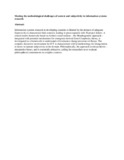| dc.contributor.author | Njihia, James Muranga | |
| dc.date.accessioned | 2013-05-07T10:10:56Z | |
| dc.date.available | 2013-05-07T10:10:56Z | |
| dc.date.issued | 2006-07 | |
| dc.identifier.uri | http://erepository.uonbi.ac.ke:8080/xmlui/handle/123456789/19743 | |
| dc.description.abstract | Information systems research in developing countries is limited by the absence of adequate frameworks to characterize their contexts, leading to preoccupation with IS project failure. A critical realist framework based on Archers social realism – the Morphogenetic approach – integrated with potential mechanisms for emergence derived from Complexity theory, is investigated as a framework to understand e-Governance change processes in Kenya. The complex discursive environment for ICT is characterized with Q methodology for triangulation to factor in operant subjectivity in the domain. Philosophically, the approach avoids positivist – interpretive biases, and is essentially abductive, calling for researchers to re-evaluate philosophical commitments in complex contexts. | en |
| dc.description.sponsorship | Warwick Business School, University of Warwick | en |
| dc.language.iso | en | en |
| dc.subject | Context | en |
| dc.subject | Subjectivity | en |
| dc.subject | Organization change | en |
| dc.subject | Emergence | en |
| dc.subject | Critical-realism | en |
| dc.subject | Complexity-theory | en |
| dc.subject | Q-methodology | en |
| dc.subject | Multi-methodology | en |
| dc.title | Meeting the methodological challenges of context and subjectivity in information systems research | en |
| dc.type | Technical Report | en |
| local.publisher | School of Business, University of Nairobi | en |

